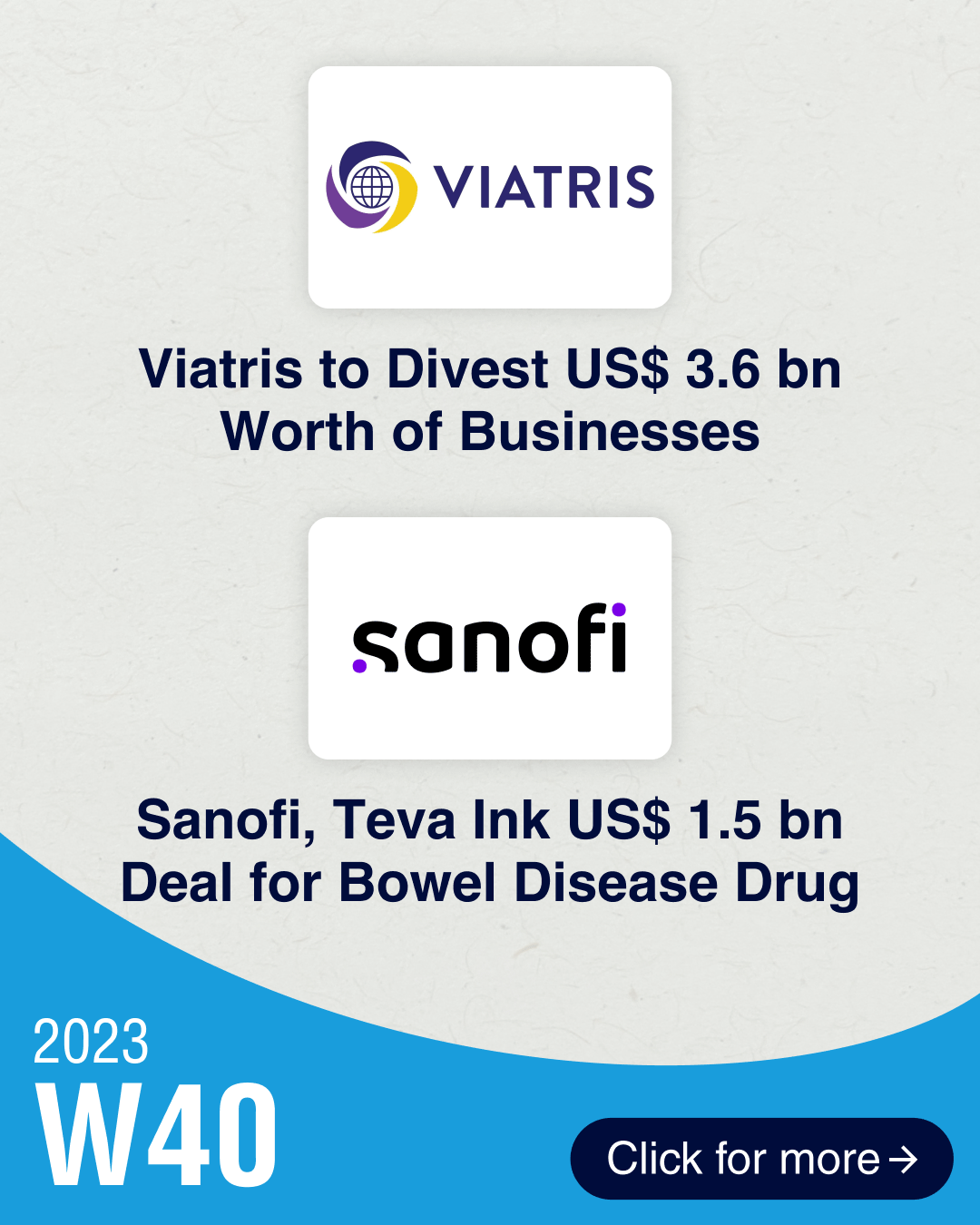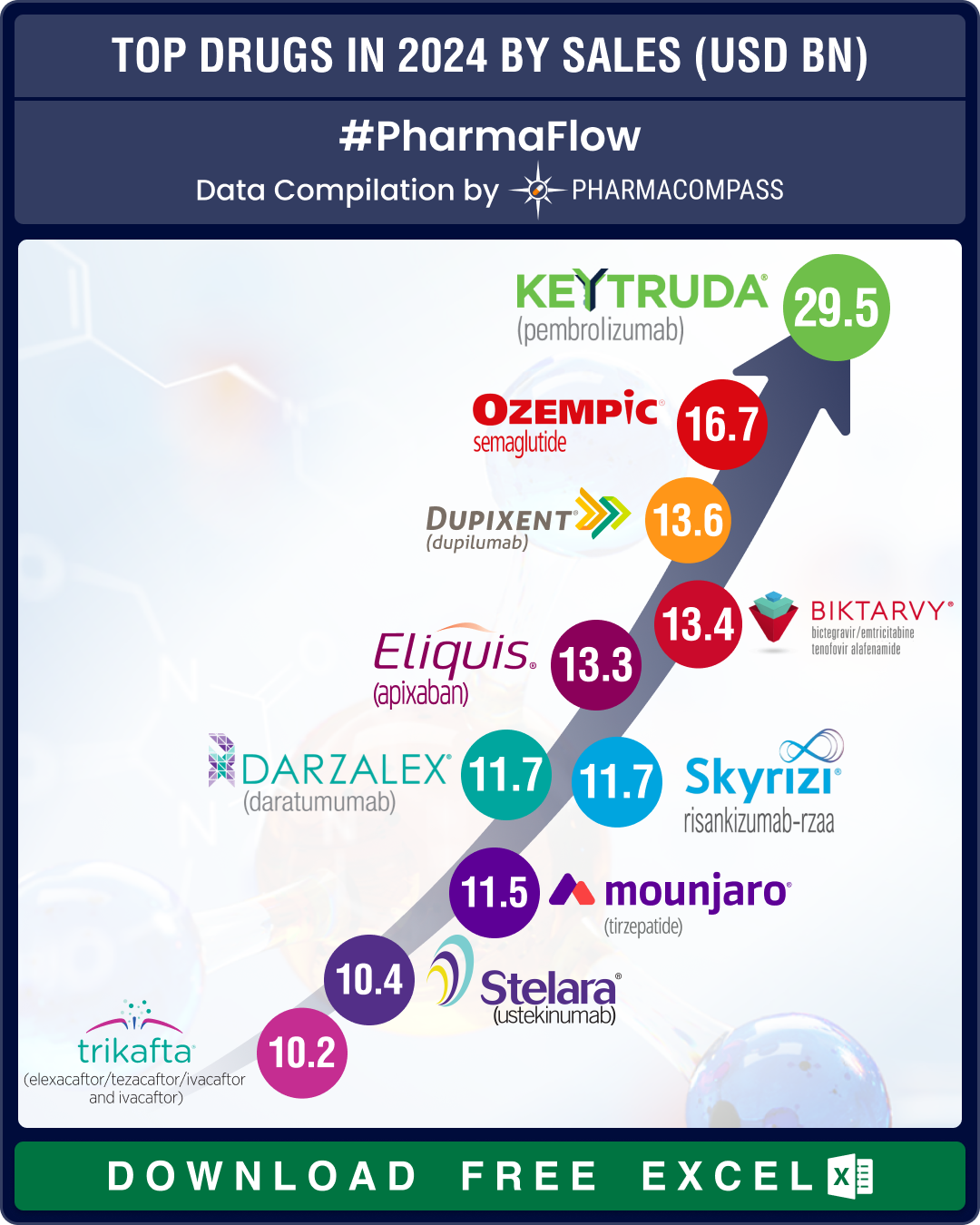
By PharmaCompass
2023-10-05
Impressions: 2,191 (Article) || 1 (Video)
Viatris is divesting parts of its businesses for up to US$ 3.6 billion as it plans to shift its focus to ophthalmology, gastroenterology, and dermatology. In other big news, all the drugmakers whose drugs figured in the first list of 10 prescription meds for Medicare’s drug price negotiation under the Inflation Regulation Act (IRA) have agreed to participate in price talks.
In deals, Sanofi has inked a US$ 1.5 billion partnership with Teva to develop a potential blockbuster treatment for inflammatory bowel disease (IBD). And Eli Lilly has acquired radiopharmaceutical company Point Biopharma for up to US$ 1.4 billion.
The US Food and Drug Administration (FDA) has granted approval to Takeda’s subcutaneous Entyvio as a maintenance therapy in adults with ulcerative colitis. It has also approved Fabre-Kramer’s antidepressant Exxua as a treatment of major depressive disorder. However, the agency rejected Eli Lilly’s lebrikizumab for treating moderate-to-severe eczema, and has raised concerns over a late-stage trial of Amgen’s Lumakras.
In trial news, Janssen has shared positive results from a late-stage trial that evaluated Rybrevant in combination with lazertinib as a first-line treatment in patients with non-small cell lung cancer (NSCLC).
In regulatory news, FDA issued a Form 483 with one observation to Aurobindo’s formulation plant in Telangana, India. And India’s drug regulator has found two more syrups with the same toxic contaminants as the cough syrups found in The Gambia, Uzbekistan and Cameroon.
Viatris to sell large parts of its businesses in US$ 3.6 billion divestiture move
Viatris has entered into agreements to divest some of its businesses for a total consideration of up to US$ 3.6 billion. This move aligns with Viatris’ long-term strategy to focus on three core therapeutic areas: ophthalmology, gastroenterology, and dermatology.
France-based Cooper Consumer Health has offered approximately US$ 2.17 billion for nearly all of Viatris’ OTC drug business, with Viatris retaining rights to drugs like Viagra, Dymista nasal spray, and select OTC drugs in specific markets. Additionally, Viatris will sell its women’s healthcare business to Spanish drugmaker Insud Pharma and its API business in India to Iquest Enterprises, generating approximately US$ 1.2 billion from both transactions.
Viatris was created in 2020, when Pfizer had spun off its Upjohn business and combined it with Mylan. Last year, Viatris had sold its biosimilar business to Biocon Biologics for US$ 3 billion.
Sanofi, Teva in US$ 1.5 billion IBD deal; Lilly buys Point Biopharma
Sanofi and Teva have partnered to develop a treatment for IBD. Sanofi is investing US$ 1.5 billion to support the development of Teva’s experimental drug, TEV’574, which is in mid-stage trials for the treatment of ulcerative colitis and Crohn’s disease, two forms of IBD. The late-stage trials for TEV’574 are scheduled to commence in 2025.
Lilly to buy Point Biopharma for US$ 1.4 billion: Eli Lilly is set to acquire radiopharmaceutical company Point Biopharma Global for up to US$ 1.4 billion, gaining access to its experimental therapies that enable precise targeting of cancer. In addition, Lilly will gain access to Point Biopharma’s Indianapolis-based manufacturing facility for radiopharmaceuticals.
Drugmakers whose meds figured in first list agree to negotiate with Medicare
All the drugmakers whose drugs figured in the first list of 10 prescription meds for Medicare’s drug price negotiation under the Inflation Regulation Act (IRA) have agreed to participate in price talks, including Johnson & Johnson, Novartis, and Amgen. This is after many of them had sued the Biden administration arguing that the new law is unconstitutional. Had the drugmakers not met the October 1 deadline to participate in talks, they would have had to pay severe penalties.
Astra to pay US$ 425 million to settle lawsuits: AstraZeneca has agreed to pay US$ 425 million to settle about 11,000 lawsuits in the US that claimed its heartburn drugs Nexium and Prilosec caused chronic kidney disease. The company, however, did not admit to wrongdoing.
J&J’s lung cancer drug beats Astra’s Tagrisso in late-stage study
Janssen (now J&J Innovative Medicine) has shared positive results from a late-stage study evaluating Rybrevant (amivantamab-vmjw) in combination with lazertinib versus Astra’s Tagrisso as first-line treatment in patients with a type of non-small cell lung cancer. An interim analysis indicated increased survival time without the disease worsening for the Rybrevant-lazertinib combo, as compared to Tagrisso.
AbbVie’s leukemia drug combo falls short in late-stage study: AbbVie’s experimental combination therapy VenDex, which consists of venetoclax and dexamethasone, failed to meet the primary endpoint of progression-free survival in a late-stage study for the treatment of a type of multiple myeloma.
Takeda’s subcutaneous version of Entyvio wins FDA approval
After rejection in 2019, Takeda finally received FDA approval for a subcutaneous (SC) version of Entyvio (vedolizumab) as a maintenance therapy for adults with moderate to severely active ulcerative colitis. This makes Entyvio the only biologic treatment for ulcerative colitis that can be administered intravenously or subcutaneously in the US.
Fabre-Kramer’s major depressive disorder med okayed: FDA has granted approval to Fabre-Kramer Pharmaceuticals’ Exxua (gepirone hydrochloride) for the treatment of major depressive disorder. Meanwhile Biogen’s biosimilar for Roche’s autoimmune drug Actemra has secured FDA approval, becoming the first Actembra biosimilar to be approved in the US.
FDA raises concerns over late-stage trial of Amgen’s Lumakras, calls it inadequate
FDA’s staff reviewers have said a late-stage study on Amgen’s Lumakras (sotorasib) might not be adequate to confirm the effectiveness of this lung cancer drug. The drug had bagged an accelerated nod, and is pursuing a standard approval, based on the outcomes of this trial. The reviewers have raised concerns over the study’s methodology and have identified issues in its conduct.
Rejects Lilly’s eczema drug: FDA has rejected Eli Lilly’s lebrikizumab, an experimental drug to treat moderate-to-severe atopic dermatitis (eczema) due to findings from an inspection of a third-party contract manufacturer. This is the third drug rejection this year for Lilly, after FDA turned down its ulcerative colitis drug mirikizumab and Alzheimer’s drug donanemab.
Issues Form 483 to Aurobindo: FDA has issued a Form 483 with one observation to Aurobindo’s formulation manufacturing facility in Telangana, India, after an inspection held during September 22 to 29. The company said that the observation is procedural in nature.
India finds more toxic syrups: Another cough syrup and an anti-allergy syrup have been identified as toxic, this time by the Indian drug regulator. These syrups, manufactured by Norris Medicines, were contaminated either with diethylene glycol (DEG) or ethylene glycol (EG). The same contaminants had been found in cough syrups in The Gambia, Uzbekistan and Cameroon that had led to the deaths of 141 children.
The PharmaCompass Newsletter – Sign Up, Stay Ahead
Feedback, help us to improve. Click here
Image Credit : Phisper Infographic by PharmaCompass license under CC BY 2.0
“ The article is based on the information available in public and which the author believes to be true. The author is not disseminating any information, which the author believes or knows, is confidential or in conflict with the privacy of any person. The views expressed or information supplied through this article is mere opinion and observation of the author. The author does not intend to defame, insult or, cause loss or damage to anyone, in any manner, through this article.”








